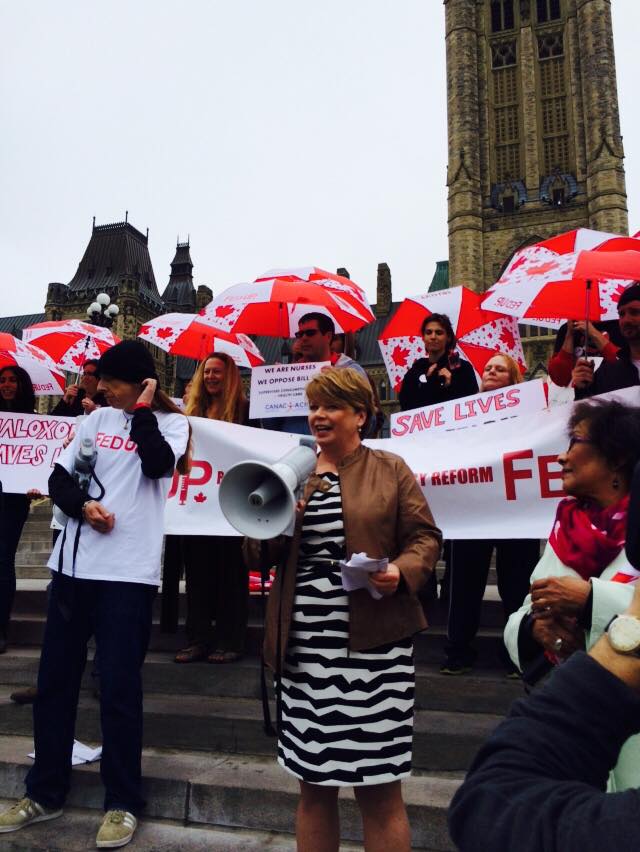*Editors Note: Due to the potential risk to employment or personal relationships, the identity of some individuals have been protected.
Canada has one of the highest rates of cannabis use in the world. 40% of Canadians have used cannabis, 10% of Canadians have used cannabis in the past year, 20% of Canadians ages 15-24 years used cannabis in the past year, 70% of Canadian cannabis users are age 25 or older.
In October 2014 the Centre for Addictions and Mental Health (CAMH) released their report, Cannabis Policy Framework, in support of the legalization and regulation of marijuana. The report “offers evidence‐based conclusions about cannabis and measures aimed at reducing harm”.
The CAMH report concluded that:
- Cannabis use carries significant health risks, especially for people who use it frequently and/or begin to use it at early age.
- Criminalization heightens these health harms and causes social harms
- A public health approach focused on high-risk users and practices – similar to the approach favoured with alcohol and tobacco- allows for more control over the risk factors associated with cannabis-related harm
From these conclusions follows another:
- Legalization, combined with strict health-focused regulation, provides an opportunity to reduce the harms associated with cannabis use.
Below are the thoughts of three individuals who support the legalization of cannabis. Finding people opposed to legalization was a bit more challenging but one woman shared her thoughts about why she thinks legalization isn’t the way to go.
Donna May: Activist, Author and Mother to a daughter who died from infection related to addiction
Donna May is a proponent for striking down the prohibition of all drugs. After losing her daughter to infections related to addiction and the use of dirty needles over two years ago, Donna committed to challenging the stigma and indignity faced by many addicts and advocating for harm reduction approaches.
“I think by CAMH making this announcement it will make them more accessible to the people that need their services. I think that’s very important. Playing up to political opinion is going to get an agency funding but the funding for what? What are you going to use that funding for? Agencies providing services for addicts are supposed to be there for the people that need it. Being on the side of political opinion constantly and not on the side of the people that need your service means that you’re putting up a barrier to people who need to access those services. We have been working to end prohibition of all drugs in many areas and especially marijuana- and for good reasons. The science that has come out shows that marijuana is a very effective type of pain relief medication and treatment for certain kinds of illnesses.”
Donna believes that CAMH’s position on the legalization of marijuana will progress her work as well as the efforts of all harm reduction allies.
“I believe that prohibition has never worked and will never work. It’s a small step in legalizing marijuana- a very small step. I’m for legalizing and regulating all forms of harm reduction whether it be marijuana, heroin use- anything of the sort. My theory is that in reducing the harms that people are already involved in- you’re saving lives and you’re keeping them alive for that one other day. And that day could be the day they might make a different choice. I don’t believe in the degradation and stigmatization that goes along with substance use – and taking these marginalized people and hiding them even further in their substance use. I believe in bringing it out in the open and treating it where the addict is at- and reducing all the harms we can to keep them alive.”
Jane: Thirty-something female, professional, married with kids
 Jane began using marijuana when she was in her early twenties. She had approached a medical professional seeking advice in dealing with a tendency towards anxiety. She left with a prescription for an anti-depressant but did not want to commit to the daily practice of popping pills. Instead, Jane made some conscious changes to her lifestyle and on occasion found a bit of calmness in the moderate use of marijuana.
Jane began using marijuana when she was in her early twenties. She had approached a medical professional seeking advice in dealing with a tendency towards anxiety. She left with a prescription for an anti-depressant but did not want to commit to the daily practice of popping pills. Instead, Jane made some conscious changes to her lifestyle and on occasion found a bit of calmness in the moderate use of marijuana.
Now busy with an active career, marriage and family life Jane enjoys the occasional toke throughout the week to unwind or to enhance her mood- whether she’s cleaning at home while the kids are out of the house, or if she’s heading out for a rare night on the town.
“I personally do it for relaxation and activity enhancement. If I’m going out I’ll do it before I leave the house and then have one or two drinks over the course of the evening without getting out of control. I think it’s better for me to relax with a joint than drinking my face off. It’s just a much better alternative for me.”
If cannabis was legalized Jane would probably not openly smoke in the community or at home. “I don’t like drinking in front of my kids so I wouldn’t smoke in front of them. It’s a private thing for me. My husband doesn’t do it and a lot of my friends don’t do it. So a lot of times it’s just a ‘me thing’- something I like to do when I’m alone.”
Jane supports the concept of legalization and regulation and does so from many perspectives- including that of a concerned parent. “Just because I support the legalization of it doesn’t mean that I think it’s ‘ok’ for kids to be doing it at the age of 12 years old. I think it should be controlled like alcohol. Right now it is more easily accessible to youth then if it was regulated.”
Jane also believes that legalizing and regulating cannabis can ensure quality control. “You never know what you’re getting- it can be biker weed vs. some nice home grown weed. There is definitely a varying degree of pot quality. Sometimes people will spray it with Lysol so it looks crispier – so it looks better. It can be really dangerous.”
Tom: Fifty-something, professional, kids flown the coop
 Seven years ago Tom woke up one morning and his life changed forever. It was two weeks before doctors could determine what was kicking him in the butt. Tom was diagnosed with an auto-immune disorder that was eating his internal organs- and especially his liver. With his liver operating at 60% capacity, Tom was placed on a transplant waiting list and on a death watch. The transplant never came and Tom never died. Defying the odds, and chalking up one for the medical books, Tom slowly rebounded. He earned his way off death watch over a period of three years and has spent the past four years returning to a productive lifestyle with just 70% liver function.
Seven years ago Tom woke up one morning and his life changed forever. It was two weeks before doctors could determine what was kicking him in the butt. Tom was diagnosed with an auto-immune disorder that was eating his internal organs- and especially his liver. With his liver operating at 60% capacity, Tom was placed on a transplant waiting list and on a death watch. The transplant never came and Tom never died. Defying the odds, and chalking up one for the medical books, Tom slowly rebounded. He earned his way off death watch over a period of three years and has spent the past four years returning to a productive lifestyle with just 70% liver function.
Living successfully means a healthy diet consisting of six moderate meals a day, resting when he needs it and staying off oral medication as well as refraining from alcohol. “Everything I take orally runs through my liver. I can’t tax it with Aspirin or Tylenol 3’s or any other medication for pain relief. But marijuana goes through your bloodstream and it’s good for pain, for relaxation and that’s why on occasion I will use it. It’s not an everyday thing, it’s not a party thing, it’s not an escapism kind of thing. But when in need it’s a great alternative and it doesn’t hurt my liver. And there are a lot of people in that situation where they can’t take medications because it’s too hard on their body.”
Tom believes that it is important for the government to control the production and distribution of marijuana for numerous reasons. From a medical perspective he is concerned that people in need of the alternative medication aren’t receiving it because the government has not taken a position on the drug and leaves the onus, and risk, on medical practitioners to prescribe or not to prescribe medical marijuana. Tom has been unable to procure a medical prescription for medical marijuana in the small Northern community of Sault Ste. Marie.
“You would have to travel to larger centre’s like Toronto or London to get one.”
Legalizing and tossing marijuana operations to private companies aren’t enough according to Tom. “The private stop guys that you would have to buy your marijuana from is way more expensive. So you have this guy on disability using it to control pain but can’t afford to buy it. So what are you doing? You’re forcing them into the underground- it doesn’t make any sense.”
Like Jane and many other users, Tom gets his marijuana from the friend of a friend of a friend that eventually gets it from a dealer.
“And that’s another reason why it should be legalized,” he commented. “Ultimately there is a dealer somewhere and he’ll probably sell to anyone. The dealer is the ‘ugly guy’ that nobody wants to admit that they know about but they really do. He’ll not only sell to my friend’s friend but he’ll also sell to some kid walking out of a school too- they don’t care.”
Caceila Trahan : Twenty- something, Youth Outreach Worker and Poverty Activist
In reaching out to the Northern community this week for thoughts regarding CAMH’s support of legalization one woman wrote in with a succinct reply opposing legalization.
Caceila Trahan does not support the legalization of cannabis- if it is taxed. Should the Canadian government legalize cannabis they will undoubtedly regulate it as a taxable good. For this poverty activist, taxing the sale of marijuana threatens an under the table income supplement for who are selling to offset an existence fraught with financial hardship.
“The benefits of an underground market can serve people of oppression and impoverishment as a means of survival. In theory, a single mother or young person with little education or skills may choose to deal small amounts of pot to make ends meet. The same theory could be applied to prostitution which is legal in Ontario but revenues earned by sex trade workers are not taxed. Taxing the sale of marijuana would still leave a vulnerable sector of people breaking the law.”
To read Caceila’s full comment her letter can be read here.
*****
Weigh in below. What are your thoughts? Is it time for Canada to legalize and regulate cannabis or not?




